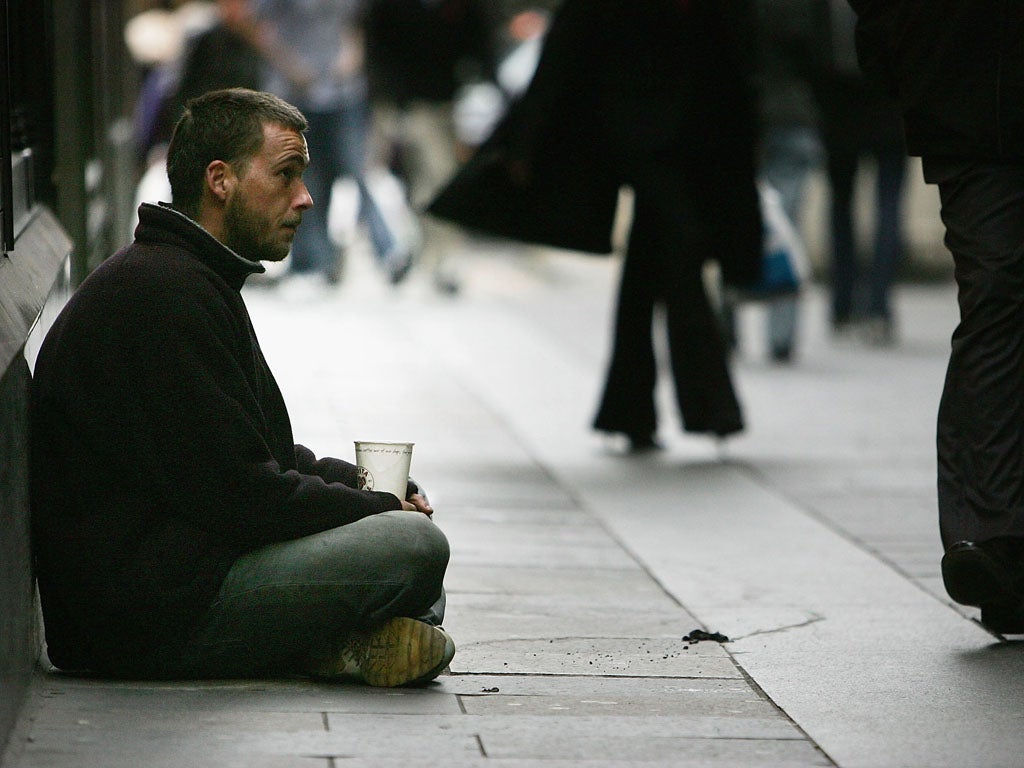From Uganda to Britain: Life was much better before I started to think about the pain of hunger
Since arriving in Britain, one thing I have failed to wrap my head around is the fact that there is poverty, homelessness and hunger in the developed world, just like in Africa

When I was growing up in Uganda, my parents, my teachers, my priest and grandparents all told me that next to mathematics, English is the most important thing you could know.
With it, they promised, you would never suffer. And if, heaven help you, you got a chance to go to the land of the English man, it would be the end of your worries. The only thing that would perhaps beat that is going to heaven.
So when a dirty-looking old man approached me here in London to give him a pound for his dinner - asking in impeccable English “Can you spare a pound for a homeless man?” - it seemed like some kind of joke.
Since arriving in Britain from Uganda a couple of months ago, one thing I have failed to totally wrap my head around is the fact that there is poverty, homelessness and hunger in the developed world, just like there is in Africa.
What was this I was seeing? Dirty people sleeping on the streets with nothing but their dogs for company; hungry pregnant women, reeking of booze and scavenging people’s rubbish for food; an able-bodied teenager almost getting on his knees, if only I can spare a penny so he can go to Tesco.
What is it that would make one starve in a land where you get paid for being unemployed? The answers to this question are as complex as the fact of the existence of these first-world beggars.
Perhaps touched by scenes such as these, the Lutheran community I live with here in London decided to help raise funds to make a difference in the lives of the hungry. My relationship with them started in our shared breakfast hall. And when they discovered I was from Uganda, they declared I was heaven sent. They wasted no time inviting me to speak at one of their events.
“We have not seen the kind of hunger that you have seen,” they explained. “You can help us understand it better.”
Not quite what I planned on doing. I would have preferred to speak to them about the beauty of my homeland, the fertile soils, the endless sunshine that is quite a rarity in London - and the fact that there are a lot of relatively comfortable people in Uganda, who have three solid meals a day, except for the days when they are too busy to be bothered about food.
In fact, my first thought was: “Oh well, why would they care about hunger? They just admitted that they have never had a glimpse of it. And we are not that hungry, are we?”
Recently, an Oxfam report showed that more and more people are going hungry in UK. But even this did not move me because, well, these hungry people at least have sleeping bags and wear warm clothing. Some even have tolerable housing. Compared to the naked Karimojong children on Kampala streets, theirs is paradise. Or so I thought.
But the chaplain was persistent and somehow I found myself sitting with a group of people looking up to me to tell them about hunger. The first task was simple enough. All we had to do was write whatever word or phrase hunger conjures up in our minds. It was the most disturbing exercise of my life.
For the first time, I truly thought of hunger and what it means. I thought of the children with the swollen bellies around my Kampala neighbourhood whom I drive past every day before entering my home and locking the gate tightly behind me. I thought of that HIV-positive woman I met on one of my work trips - and how when she told me she was so hungry she did not have milk in her breasts, I firmly pushed that aside and concentrated on the issue at hand: HIV/AIDS and domestic violence. Hunger was just too much for me. Of all injustices, hunger is probably the most unfathomable. How, why should you be hungry?
And as we bowed our heads in contemplation, I felt the tears welling up. The other women were crying too. This was serious. It was not just another group of privileged people trying to feel better by giving a fraction of what they have. They had actually thought of hunger, probably more than the average elite African. As I started to talk about it, I could not speak - not just for the lack of words but for the chocking tears. Life was much better before I started to think of hunger, so much better.
But alas, the women have infected me with their disease. Now whenever I see a homeless hungry person I actually think about what they must be going through and, if there is not much in my fridge, say a little prayer for them. I imagine it must be even worse for the beggar with the good English, for not many people appreciate his hunger. Every time I raise the issue of homeless people in London, I get a dismissive vague answer with words like alcohol and drug addiction.
Maybe I am stupid to care and my fast-beating heart just might give way when I get back to Uganda, where there is a hungry person at every corner. But there is no running away from hunger now.

Join our commenting forum
Join thought-provoking conversations, follow other Independent readers and see their replies